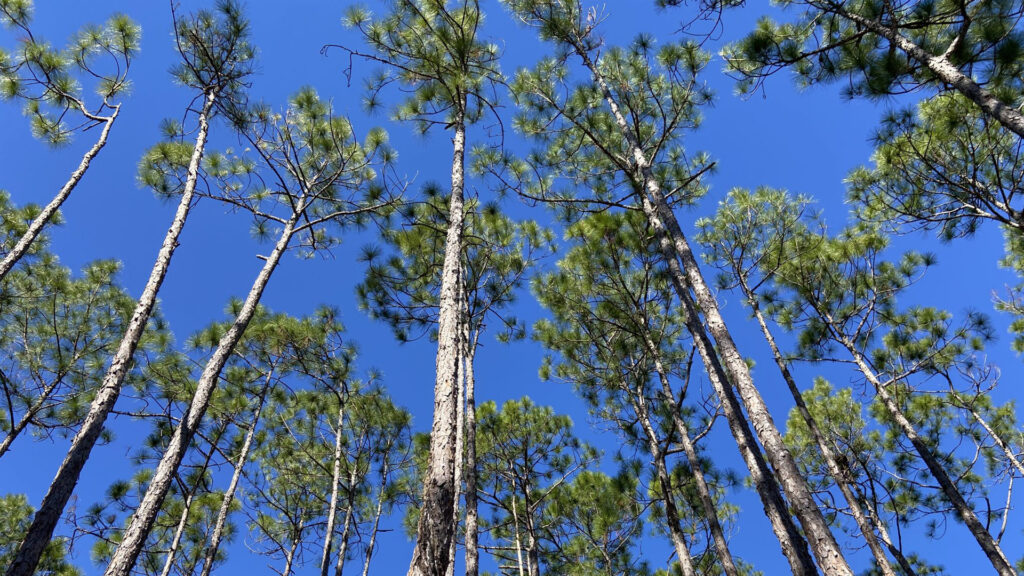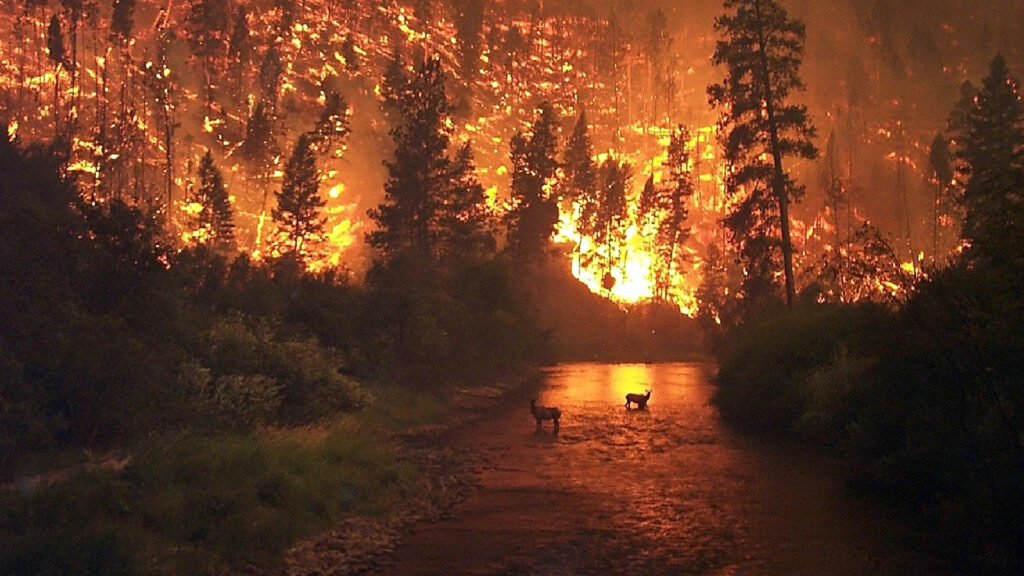By Lauren Barnett, University of Florida College of Liberal Arts and Sciences
Climate change is reshaping forests differently across the United States, according to a new analysis of U.S. Forest Service data. With rising temperatures, escalating droughts, wildfires and disease outbreaks taking a toll on trees, researchers warn that forests across the American West are bearing the brunt of the consequences.
The study, led by UF Biology researchers J. Aaron Hogan and Jeremy W. Lichstein was published in the Proceedings of the National Academy of Sciences. The study reveals a pronounced regional imbalance in forest productivity, a key barometer of forest health that gauges tree growth and biomass accumulation. Over the past two decades, the Western U.S., grappling with more severe climate change impacts, has exhibited a notable slowdown in productivity, while the Eastern U.S., experiencing milder climate effects, has seen slightly accelerated growth.
Forests play a critical role in regulating the Earth’s climate, acting as carbon sinks that sequester approximately 25% of human carbon emissions annually. However, their ability to store carbon hinges on the delicate balance between the positive and negative effects of climate change. The study, using national-scale forest inventory data, models trends from 1999 to 2020, analyzing 113,806 measurements in non-plantation forests.

“We are witnessing changes in forest functioning as forest ecosystems respond to global change drivers, such as carbon-dioxide-fertilization and climate change,” said Hogan. “It is the future balance of these drivers which will determine the functioning of forests in the coming years to decades.”
Some drivers, such as droughts and forest pathogens, have negative effects on productivity, but other drivers, such as carbon-dioxide fertilization, are predicted to have positive effects. This phenomenon suggests that increased carbon-dioxide levels enhance plant growth by increasing photosynthesis, which inspired the researchers to take a deeper look at its impact.
“The U.S. Forest Service has been monitoring the growth and survival of over a million trees across the U.S. for multiple decades,” said Lichstein. “We were interested to see if their data provided evidence for increased rates of tree growth, as predicted by the carbon-dioxide fertilization hypothesis.”
While tree growth in the Eastern U.S. aligns with expectations, the Western region shows extreme climate effects overshadowing any positive growth trends, challenging the prevailing assumption that forests’ carbon-storing ability will continue to increase.
“Our study suggests that future projections of climate and sea-level rise may be too optimistic because, in reality, ecosystems are likely to store less carbon in the future,” said Lichstein. “Less ecosystem carbon storage means more carbon in the atmosphere and therefore more warming and accelerating climate change.”
The findings also illuminate the fact that climate change is not a uniform force but rather a dynamic agent with region-specific influences. The study illustrates how the degree of climate change can push forests past a tipping point. Some forests are already approaching or surpassing climate thresholds which shift them to become sources of carbon, rather than sinks that remove carbon from the atmosphere.
“Ecosystem carbon sequestration is not guaranteed to be permanent, and it can be reversed by climate change,” said Lichstein. “This reversal is already happening in the Western U.S., and there are signs that it may also be happening in other drought-impacted regions of the world, such as the Amazon.”
It might be tempting to chalk the losses up to extreme events. But, according to the researchers, the decline in productivity in the Western U.S. cannot be attributed to increased rates of tree mortality.

“We hear a lot about wildfires in the Western U.S., which kill a lot of trees and release carbon to the atmosphere,” said Lichstein. “But our study shows that additional ecosystem carbon loss in Western forests is occurring due to declining tree growth rates.”
With trees growing slower due to adverse climate change effects, including decreased precipitation, the study implies that, even without the intensifying wildfires, the carbon sink in Western forests will continue to weaken without urgent action to reduce human greenhouse gas emissions.
“We must have healthy forests in connection with emissions reduction to restore the global carbon balance and limit climate change,” said Hogan.
The transformations observed in U.S. forests raise concerns about their future resilience and sustainability. The researchers hope their findings highlight the urgent need for governments and industry to work together to reduce greenhouse gas emissions and achieve net-zero emissions as soon as possible.
“Our results highlight the need for reduced global greenhouse gas emissions,” said Lichstein. “Without the emissions reductions that scientists have been urging for decades, forest carbon sinks will likely weaken, which will accelerate the pace of climate change.”
This study was developed with Grant Domke from the U.S. Forest Service Northern Research Station, Kai Zhu from the University of Michigan, and Dan Johnson from UF’s School of Forest, Fisheries, and Geomatics Sciences.
Explore the full study here: doi.org/10.1073/pnas.2311132121.
This piece was originally published at https://news.clas.ufl.edu/climate-change-threatens-global-forest-carbon-sequestration-study-finds/.
Sign up for The Invading Sea newsletter by visiting here. If you are interested in submitting an opinion piece to The Invading Sea, email Editor Nathan Crabbe at nc*****@*au.edu.



